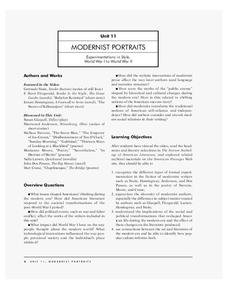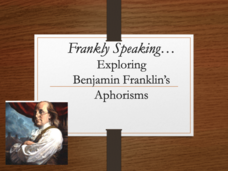Annenberg Foundation
Migrant Struggle
The American Dream is a goal that many pursue, but is it truly attainable for all people? An in-depth lesson explores the plight of migrants in twentieth-century America. The resource includes a video and author biographies and...
Annenberg Foundation
Poetry of Liberation
How do writers use words to protest injustice, challenge the status quo, and shape their own identities? Individuals watch and discuss a video, read author biographies, write poetry and journals, develop a slideshow, and complete a...
Annenberg Foundation
Modernist Portraits
How did literature reflect people's attitudes in post-World War I America? A lesson explores the topic using a variety of activities. Individuals watch and respond to a video; read author biographies and engage in discussion; write...
PBS
Frankenstein: The Consequence of Creation
Famous as a horror story, as the first science fiction novel, Frankenstein is also a tale of ambition, a warning about unbridled science, and responsibility for actions. Readers consider what the tale says of the consequences of creation...
Digital Public Library of America
Their Eyes Were Watching God by Zora Neale Hurston
Zora Neale Hurston's novel Their eyes Were Watching God has been highly praised and severely criticized for its depiction of African American folk culture. A set of primary source materials, including photographs, articles, essays, and...
PBS
Breaking the Code: Actions and Songs of Protest
Ezell Blair, Jr., David Richmond, Franklin McCain and Joseph McNeil changed history. Their sit-in at the lunch counter of the Woolworths in Greensboro, North Carolina on February 1, 1960 became a model for the nonviolent protests that...
Chandler Unified School District
Frankly Speaking: Exploring Benjamin Franklin's Aphorisms
Benjamin Franklin famously had an aphorism for every situation—most of which we still use in modern vernacular. Introduce class members to Franklin's Poor Richard's Almanack with a presentation that details the characteristics of aphorisms.
Simon & Schuster
Curriculum Guide to: Frankenstein by Mary Shelley
The activities in a curriculum guide to Mary Shelley's Frankenstein provide readers with an opportunity to explore various concepts in depth. First, groups research controversial scientists, examine their work, and decide whether or not,...
Digital Public Library of America
The Poetry of Emily Dickinson
Are you contemplating a poetry study featuring Emily Dickinson? Finding good primary sources to accompany the study can be a challenge—never fear, help is here! Check out this primary source set that includes manuscripts of several of...
Curated OER
Our “Civilized” Society
The Scarlet Letter is the anchor text in a four-week unit that examines Hawthorne's novel through the lens of the intolerances found in a supposed civilized society. In addition to their reading, class members watch clips from...
National Endowment for the Humanities
Tales of the Supernatural
Scary stuff! Whether approached as the first horror story or a "serious imaginative exploration of the human condition," Frankenstein continues to engage readers. Here's a packet of activities that uses Mary Shelley's gothic...
Curated OER
Analogy: Reasoning by Comparison
"Life is like a box of chocolates. . ." "Barack is a Mac, Hillary is a PC." Literal and figurative analogies are featured in a presentation that models how to use analogies to bolster arguments.
National Endowment for the Humanities
Kate Chopin's "The Awakening": No Choice But Under?
The first in a series of three resources designed to accompany a reading of Kate Chopin's The Awakening provides readers with background information about Chopin, Creole culture, literary realism, and women's suffrage.
Boston University
South African Short Stories: Apartheid, Civil Rights, and You
How are short stories from South Africa connected to issues of civil rights in the United States? A unit plan uses South African short stories to discuss issues such as apartheid, colonization, and civil rights. Questions and activities...













